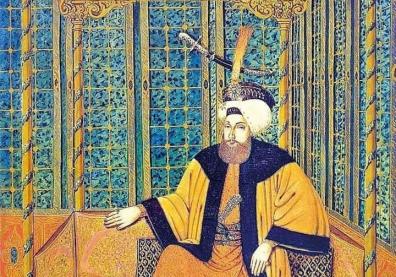Music at the Palace during the Egyptian Expedition
Concert based on works by Sultan Selim III by the Association musicale franco-turque de Paris, conducted by Selin Tenik

This musical evening is placed under the conjunction of three times: a historical event, a sultan poet and musician, and a choir. Its ambition is to combine historical research with music. It stems from the history of Napoleon Bonaparte's Egyptian campaign (1798-1801), which recently gave rise to two books, the first entitled l'Expédition d'Egypte, Alexandrie et les Ottomans; l'autre histoire (Centre d'Etudes alexandrines, 2017, www.peeters-leuven.be), the other in Turkish, Napolyon'un Mısır'ı İşgali ve Osmanlı-Fransız Savaşı (1798-1802): Orta Doğu'nun Dönüm Noktası (Institut français d'Etudes anatoliennes d'Istanbul, 2024, https://zerobooksonline.com), both written by a member of INALCO-CERLOM and our choir, Faruk Bilici.
We take advantage of this evening to present the other book by the same author: Le Canal de Suez et l'Empire ottoman (CNRS Editions, 2019, www.cnrseditions.fr), translated into Turkish as Süveyş Kanalı ve Osmanlı İmparatorluğu (Türkiye İş Bankası Kültür Yayınları, 2024, www.iskultur.com.tr).
The subject of Beethoven's Third Symphony, Eroïca, Napoleon Bonaparte, an admirer of Italian opera, attached particular political interest to music. For Selim III (1761-1808), however, music was a passion and an almost daily occupation, especially in the period leading up to his accession to the throne. A contemporary of Louis XVI and Napoleon Bonaparte, Selim III (reign: 1789-1807), had a high-level literary and musical education from the masters of his time.
Composer of some one hundred works in all genres, Selim III (artist pseudonym: Ilhâmi) was also the author of song texts and above all the creator of a number of musical forms (makâm). Until the adoption of Western notation, notably French, in the XIXe century, Ottoman music used the notes developed at the time of Selim III, thanks to Hamparsum Limonciyan and Abdülbaki Nasır Dede.
As part of the scientific and cultural activities of CERLOM and the Association musicale franco-turque de Paris, we are honored to present here these works and this musical program reserved exclusively for the works of Selim III, under the direction of his conductor, Selin Tenik.
Musicians
Mithat Çömlekçi: Ud (oud)
Murat Can: Kanun (Qanûn)
Ali Osman Erdoğdular: ney (nay)
Daniel Randé: percussion